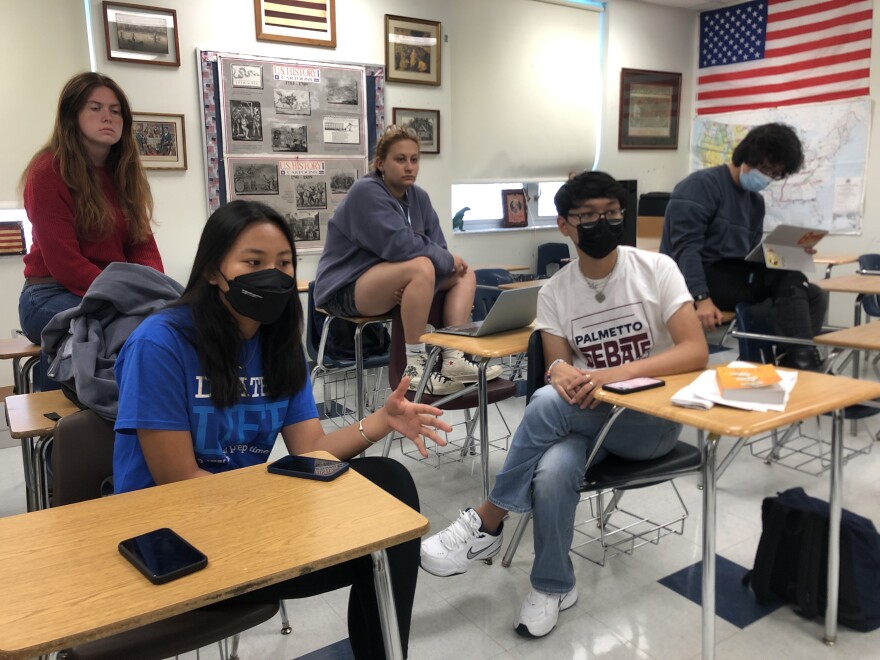It put her on the path to success in law and in life. That’s how U.S. Supreme Court nominee Ketanji Brown Jackson has described her time on the speech and debate team at Miami Palmetto Senior High School.
“I learned how to reason and how to write. And I gained the self confidence that can sometimes be quite difficult for women and minorities to develop at an early age,” Jackson said during a lecture at the University of Georgia in 2017.
The Miami native is making history as the first Black woman to be nominated to the nation’s highest court. Monday marked the start of Jackson's confirmation hearings before the Senate Judiciary Committee.
“It was my high school experience as a competitive speaker that taught me how to lean in despite the obstacles,” Jackson said.
For students on the school’s debate team now, Jackson’s historic nomination is changing the way they see themselves and each other.

It’s not that much of an exaggeration to say one of these kids could become a U.S. Supreme Court justice.
At least that’s been the feeling at the Palmetto Senior High speech and debate club, ever since Ketanji Brown Jackson was nominated by President Biden.
“It could be any one of us that could be sort of the next Ms. Brown,” said Paul Yan, co-president of the club. “We were looking through the yearbooks ... and we saw all her photos. So that's really very eye-opening. I feel like it's very meaningful for a lot of students here as well. Because coming from minority status, to see someone in power is very life-changing.”
Yan and his co-president Anna Liu are both Chinese American.
“I think it's just really exciting that she comes from a background not so different from a lot of us,” Liu said.
These students had dreams long before they heard about Jackson. But the nomination of a fellow Palmetto debater to the U.S. Supreme Court is making them dream bigger.
“I think it just makes me reevaluate where I am in my life and like where I could be. And also just look at my peers with a new light, because I'm just really excited for all that we can accomplish.”Anna Liu
Liu is a senior and will be heading off to college soon with plans to study computer engineering. She said there are some promising underclassmen she’ll be keeping her eye on — maybe for decades to come.

On the day WLRN visited Palmetto Senior High, a dozen members of the team gathered in Mr. Silvio Vargas’ history classroom for a mock debate. The topic: Is civil disobedience morally justifiable within a democracy?
“They’re in pairs right now and they’re sort of developing arguments in favor and against,” explained the club's vice president Jason Salguero. “Because in debate competitions you don’t know which one — you don’t know which side you’re going to get until you get there.”
Sophomore Virginia Martinez-Rodriguez and senior Aiden Kong faced off, flipping a coin to see which side they would take. Martinez-Rodriguez made her case first, arguing that civil disobedience is not only defensible but vital.
“It benefits the people. It benefits society,” Martinez-Rodriguez argued. “It is a disruption of the peace and order to inform the government and tell the government that we will not stand with something that goes against its own people. That it exists to serve us.”
Kong pushed back, questioning whether violent resistance should be justified as well.
“Civil disobedience poses a threat to the rule of law. Because in the end, even though it’s meant to push certain ideas forward, it is breaking the law,” Kong countered.

It’s during practices like this that students learn how to stand up and defend themselves — and how to take criticism.
Condoleezza Alexis is a sophomore who joined debate this year.
“Ever since I've joined I feel like I've become more of a confident person,” said Alexis. “And it's really affirmed my belief that I want to be a lawyer and that this is something that I want to pursue when I get older.”
She says the club has made her more sure of herself and what she wants — just like it did for Ketanji Brown Jackson.
“She is a woman of color who went to Palmetto and so am I. And although I don't really want to go into politics per se, I still find her story kind of a similar introductory for mine.”Condoleezza Alexis
Jackson has talked about the bias and exclusion she faced at the school in the predominantly white, wealthy suburb of Pinecrest. Alexis says she’s had her own struggles fitting in there.
But knowing that Jackson walked these same halls makes Alexis believe that could be her one day.
“Seeing her get that far and knowing that it is possible for not only me to get that far, but for any Black woman to get as far as she can, as she did, as long as you try hard enough — it's really inspirational."
She feels like she’s watching barriers that have oppressed people of color for centuries come down in real time.
Jackson isn’t only showing Alexis how to break through one of the highest ceilings in American politics, but how to just navigate high school.
And if Alexis can do that, who knows where she’ll be 30 years from now.






